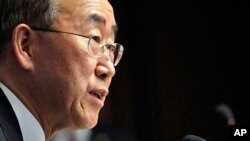The United Nations Security Council has unanimously adopted a resolution underlining the need for continued international action to halt the impact of HIV and AIDS in conflict and post-conflict situations. The move comes ahead of a three-day U.N. high-level meeting, beginning Wednesday, on the international community’s AIDS response.
Tuesday’s discussion of the virus, which has killed more than 25 million people since it was first reported 30 years ago, focused on how U.N. peacekeeping missions can be important players in an integrated response to combating and preventing the spread of AIDS.
The U.N. has more than 122,000 military, police and civilian peacekeepers deployed around the world. U.N. Secretary-General Ban Ki-moon, who took part in the debate, said for U.N. personnel, pre-deployment HIV training is standard.
He noted that over 1,500 peacekeepers have been trained as peer counselors and more and more peacekeepers are making use of voluntary counseling and testing.
“But we are not just helping our peacekeepers - they work so people recovering from war do not also have to recover from disease. It is all part of the broader mission this council entrusts to our troops: to stop gender and sexual-based violence; to enhance the role of women; and to protect children,” Ban said.
It is rare for health issues to be discussed in the Security Council, where crises concerning international peace and security are the norm. The 15-member council took up the AIDS issue only once before, in 2000, when it adopted a resolution that recognized the potential of the epidemic to pose a risk to stability and security if left unchecked.
The secretary-general said that before the earlier AIDS resolution was adopted, uniformed personnel were viewed in terms of the risk they might pose to civilians. He said now they are seen as positive agents of prevention, care and treatment.
Africa, where the U.N.’s largest peacekeeping missions are based, has been affected disproportionately by HIV and AIDS. Of the 34 million people UNAIDS estimates are living with the virus worldwide, 22.5 million of them live in Africa and some 60 percent of them are women and girls. Nearly 15 million African children have lost at least one parent to AIDS-related illnesses.
UNAIDS Executive Director Michel Sidibé told the council that the newly adopted resolution is moving in the right direction in calling for HIV prevention among peacekeepers to be aligned with efforts to prevent sexual violence in conflict - one of the ways women and girls are exposed to the virus. He is heard here through an interpreter.
“We see that post-conflict and transition periods bring an increased risk of HIV and sexual violence. We understand now how to address both these challenges. We have made progress and now we must scale up these efforts,” Sidibé said.
He noted that global, national and personal insecurity will undermine efforts to achieve universal access to prevention, treatment, care and support.
On Wednesday, the U.N. General Assembly will begin a high-level three-day conference charting the path forward on the global AIDS response.
UN Security Council Notes Peacekeepers Role in Combating HIV/AIDS






